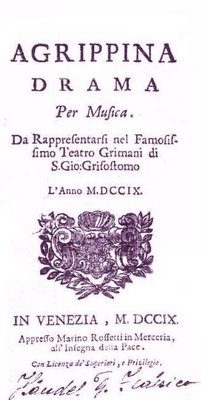Oh, That Silly Agrippina
 On Friday night, Virginia Opera brought its production of Handel's Agrippina to an undersold George Mason University Center for the Arts in Fairfax for two performances. Directed by Lilian Groag (who also mounted it for Glimmerglass Opera, much more sumptuously), this staging went far beyond a typical interpretation of Handel's youthful masterpiece, identified on its title page only as a drama per musica. As was quite common in this period of Venetian opera, the libretto mixes comic and tragic elements, but does that justify turning Agrippina into a silly farce? Here is how Handel's biographer Winton Dean put it:
On Friday night, Virginia Opera brought its production of Handel's Agrippina to an undersold George Mason University Center for the Arts in Fairfax for two performances. Directed by Lilian Groag (who also mounted it for Glimmerglass Opera, much more sumptuously), this staging went far beyond a typical interpretation of Handel's youthful masterpiece, identified on its title page only as a drama per musica. As was quite common in this period of Venetian opera, the libretto mixes comic and tragic elements, but does that justify turning Agrippina into a silly farce? Here is how Handel's biographer Winton Dean put it:
The ability to suggest the profound, the commonplace and the ridiculous aspects of human behaviour, not only in the same opera but in the same scene and situation, places Handel beside Monteverdi and Mozart as a master of dramatic irony on many levels. The spirit of playful comedy is not absent from Handel's most serious operas. [...] This comprehensiveness of mood and dramatic approach gives his operas a depth seldom attained in the history of the art. But their quality can emerge only from productions based on a complete understanding of the convention.In other words, directors would do better to trust Handel's innate dramatic sensibility, which usually surpasses their own, rather than giving into apprehension that their audience is not capable of appreciating Baroque opera on its own terms. Judging by the reviews, David McVicar has done no better in this regard in his production of Agrippina now at English National Opera (see the reviews linked in the inset below).
After making a name as an opera composer in Hamburg, the young Händel set off for Italy. He caught a big break while in Venice during the 1709-1710 season, in the opportunity to compose the music for a new opera at the Teatro S. Giovanni Grisostomo. Cardinal Vincenzo Grimani, who owned the theater, provided the libretto himself for Agrippina (HWV 6, for which Indiana University has made an online score available in its remarkable Variations prototype). The wild success of the opera with Venetian audiences made it "the climax of Handel's career up to the age of 25," as Winton Dean saw it.
Here is an opera whose setting would lend itself to the cold-hearted, modern interpretation we recently saw applied by the Kirov Opera, in a misguided way, to Verdi's Falstaff. In this opera, at least, we really do have a bunch of blood-thirsty wealthy elites -- the Roman imperial family -- who are certainly capable of the worst. Empress Agrippina hears that her husband, Claudio, has died and immediately sets in motion a plan to have her son, Nero (Nerone), named Emperor. When Claudio turns up alive, she has to try to have him killed, while plotting to unseat Ottone, whom Claudio named his successor, through a scheme involving Poppea, the mistress of all three men.
Mark J. Estren, Virginia Opera's 'Agrippina' Shines With Modern Twists And Political Turns (Washington Post, February 12) T. L. Ponick, Modern-day 'Agrippina' with a bit of zing (Washington Times, February 3) April Phillips, Virginia Opera gets down and dirty with farcical "Agrippina" (Virginia Pilot, January 25) English National Opera: Anna Picard (The Independent) Anthony Holden (The Observer) Edward Seckerson (The Independent) Warwick Thompson (Bloomberg News) |
The cast was of mixed quality, at about the level one would expect from a regional company charging lower ticket prices (maximum price, $90). The strongest singing came from the women, especially soprano Jane Redding, who glittered vocally as Poppea, especially in Vaghe perle, eletti fiori in Act I. Sujung Kim was strong as Agrippina, although some of the more demanding passagework of the role was not really there. Countertenor David Walker was not in optimal voice as Ottone, with a nervous flutter that soured the pitch occasionally. Still, his impressive experience in Baroque specialized performance was evident in the fine ornamentation he incorporated, and his rendition of the stunning Act II aria Voi che udite il mio lamento was particularly fine.
Tenor Jeffrey Halili was mostly underpowered and overacted in the role of Nerone, which Handel created for a soprano castrato (a fact suspiciously absent from the program notes). Bass-baritone Derrick Parker brought a well-projected, throaty sound to Emperor Claudio, but without much stylistic sensitivity (strange, given his experience singing Baroque opera). The only member of the supporting cast who requires mention is Matthew Burns, who had a consistently pleasing sound as Pallante.
Agrippina has its final two performances in Richmond this Friday and Sunday. Virginia Opera's final production of the season, a double-bill of Cavalleria Rusticana (with Cristina Nassif as Nedda) and I Pagliacci, opens on March 9 in Norfolk. It will come to George Mason on March 30 and April 1.




















































No comments:
Post a Comment